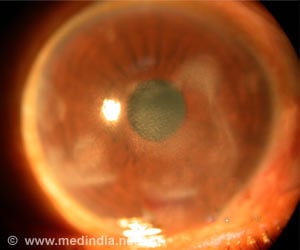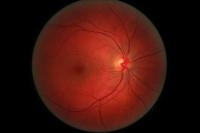The retina is rich in long-chain ω-3 polyunsaturated fatty acids (LCω3PUFAs). Thus, dietary sources of omega-3 fatty acids offer protection against diabetic retinopathy.

‘Consumption of at least 500 mg/d of omega-3 fatty acids from the diet (easily achievable with 2 weekly servings of oily fish) prevents diabetic retinopathy.’





Aleix Sala-Vila, D.Pharm., Ph.D., of the Lipid Clinic, Barcelona, and colleagues conducted a prospective study within the randomized clinical trial Prevencion con Dieta Mediterranea (PREDIMED), testing Mediterranean diets supplemented with extra virgin olive oil or nuts vs a control diet for primary cardiovascular prevention. The trial was conducted in primary health care centers in Spain. From 2003 to 2009, 3,614 individuals age 55 to 80 years with a previous diagnosis of type 2 diabetes were recruited. Full data were available for 3,482 participants (48 percent men; average age 67 years). Meeting the dietary LCω3PUFA recommendation of at least 500 mg/d for primary cardiovascular prevention was assessed by a validated food-frequency questionnaire.Of the participants, a total of 2,611 (75 percent) met the target LCω3PUFA recommendation. During a median follow-up of 6 years, incident DR was diagnosed in 69 of the study participants. After adjusting for age, sex, intervention group, and lifestyle and clinical variables, participants meeting the LCω3PUFA recommendation at baseline (500 mg/d or greater) compared with those not fulfilling this recommendation (less than 500 mg/d) showed a 48 percent relatively reduced risk of incident sight-threatening DR.
"Our findings, which are consistent with the current model of the pathogenesis of DR and data from experimental models, add to the notion of fish-derived LCω3PUFA as a healthy fat," the authors write.
Eat Your Fish or Go for Nuts The PREDIMED study provides food for thought for those who wish to fight the complications of diabetes by clever eating, writes Michael Larsen, M.D., D.M.Sc., of Rigshospitalet-Glostrup and University of Copenhagen, Glostrup, Denmark, in an accompanying commentary. "It seems a safe bet now to spread one's food intake to include the gifts of our oceans and forests, while we consider how they can be protected for future generations and wait for large and ambitious studies of the effects of diet on diabetic retinopathy. The success of such studies in age-related macular degeneration shows that solid scientific information is worth waiting and working for." The study is published online by JAMA Ophthalmology.
Source-Eurekalert















